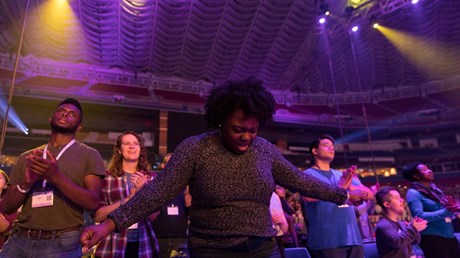Monday, 31 December 2018
2 Corinthians 5:17
from
https://www.biblegateway.com/passage/?version=NIV&search=2%20Corinthians%205:17
Urbana Faces the Challenge of Calling Gen Z to Missions
Despite its lowest attendance in decades, InterVarsity’s historic conference aims to combat student cynicism through scriptural hope.

Plenty of today’s evangelical leaders look back to Urbana conferences over the years as the catalyst that drove them to ministry.
But for the shrinking crowd at InterVarsity Christian Fellowship’s (IVCF) triannual conference—held over the past few days in St. Louis—the path to the mission field appears more complicated.
The college students who attended Urbana ‘18, though passionate about Christ, hold different expectations for life after graduation, often taking longer to settle into a vocation, and carry stress over growing student debt.
“This is changing the way that InterVarsity and mission agencies are engaging with participants,” said Greg Jao, senior assistant to IVCF president Tom Lin.
“We need a longer-term strategy to help people who may make decisions about the missions field while they’re at Urbana as college students sustain their interest and commitment over the longer period of time that it takes to figure it out.”
Determining how to navigate these challenges as Generation Z enters college is crucial for ministries like Urbana. Attendance at the historic conference is down to its lowest in at least 20 years, with around 10,000 attendees in 2018, compared to 16,000 in 2015.
But the crowd and speakers were more diverse than ever, already resembling the majority-minority demographics of the next generation: 64 percent of attendees were non-white.
“At the conferences that I’ve been to that have been less diverse, I felt I was unrepresented and it was hard for me to worship well,” Daniela Bushiri, an engineering major at New Jersey Institute of Technology, told CT. “Seeing minorities on the stage means a lot because it shows us that we ...
from
http://feeds.christianitytoday.com/~r/christianitytoday/ctmag/~3/-xdhTK4Nrqc/urbana-2018-gen-z-missions-intervarsity.html
Building on the Black Church’s Bible Legacy
How African Americans outpaced the country in Scripture-savvy—and why ministry leaders expect even more from them.

African Americans have held tight to their Bibles over the years. Amid cultural shifts in beliefs and reading habits, their demographic consistently outranks other racial groups for their reliance on the Word. Last year, the American Bible Society (ABS) once again named African Americans “the most Bible engaged in the US.”
They are more likely to own a Bible—93 percent of African Americans do, versus 82 percent of Americans overall—and more than twice as likely to say Bible reading is crucial to their daily routine, according to the society’s 2018 State of the Bible report.
“Generally, African Americans are deeply spiritual people. In my generation, many of those that were not church attendees, or even Christian, still had a great respect for the Bible,” said Mark Croston, national director of black church partnerships for LifeWay Christian Resources. “Black people love to quote and tote the Bible.”
Their tight relationship with Scripture grows out of a rich spiritual tradition and can carry on even when other markers of faith fade away. African Americans know biblical narratives on suffering and deliverance because they have lived them and experienced God’s fulfilled promises for themselves, African American church leaders say.
The latest statistics touting African Americans’ engagement with the Good Book present an opportunity to build on the legacy of the black church and bring deeper understanding.
“The results of the survey are encouraging, but they also serve as a core motivation to continue the great legacy of orthodoxy and orthopraxy,” said Earon James, lead pastor at Relevant Life Church in Pace, Florida, and pastor-in-residence at The Witness—A ...
from
http://feeds.christianitytoday.com/~r/christianitytoday/ctmag/~3/NFqHNvDIzhE/african-american-bible-reading-abs-pew.html
Should Christians Quote Muhammad?
Asia Bibi’s acquittal may model how to persuade Muslims of religious freedom.

Christians breathed a sigh of relief last October when Pakistan’s Supreme Court acquitted Asia Bibi, a Christian mother of five on death row, of blasphemy charges against Islam. What many might not have noticed was the Islamic rationale.
Whether or not she spoke against Muhammad, Bibi was insulted first as a Christian, wrote the judge. And on this, the Qur‘an is clear: Do not insult those that invoke other than Allah, lest they insult Allah in enmity without knowledge.
The verdict also quoted Islam’s prophet himself: “Whoever is cruel and hard on a non-Muslim minority, or curtails their rights … I will complain against the person on the Day of Judgment.”
And finally, it referenced an ancient treaty that Muhammad signed with the monks of Mount Sinai: “Christians are my citizens, and by God, I hold out against anything that displeases them.… No one of the Muslims is to disobey this covenant till the Last Day.”
Today it can seem like Muslims violate this covenant the world over. But does the Bibi decision validate those who insist that Islam rightly practiced is a religion of peace? And should Christians join Muslims to share verses that comprise the Islamic case for religious freedom?
CT surveyed more than a dozen evangelical experts engaged with Muslims or scholarship on Islam who reflected on three key questions when considering interpretations of Islam that favor religious freedom.
Is It True?
Pakistan’s verdict relied on three sources that inform Islam: the Qur‘an, the Hadith, and covenants.
The Qur‘an is the foundational text, considered to be dictated by Allah. The traditions, or Hadith, were collected by men, are subject to critical review, and have become ...
from
http://feeds.christianitytoday.com/~r/christianitytoday/ctmag/~3/ihh5r361TFs/asia-bibi-verdict-christians-quote-muhammad.html
Gleanings: January/February 2019
Important developments in the church and the world (as they appeared in our November issue).Important developments in the church and the world (as they appeared in our January/February issue).

Evangelicals rally against religious restrictions
Bulgarian lawmakers eased proposed restrictions on training, foreign funding, and missionary outreach by Protestants and other minority faiths following an evangelical outcry. Thousands of evangelicals prayed outside the Parliament in Sofia against the draft amendments to the Eastern European nation’s Religious Denomination Act, which were also condemned by leaders of its Eastern Orthodox majority as religious freedom violations. A revised proposal did away with measures that would threaten evangelicals’ rights to launch seminaries and host foreign preachers in the former Communist country.
Dozens killed in cathedral massacre
At least 40 people and two priests died in a November attack on the compound of the Cathedral of the Sacred Heart, a Catholic mission sheltering refugees in the largely Christian town of Alindao in the Central African Republic. The local bishop was gunned down as attackers looted the church and burned the surrounding camp. The attack was the latest violent clash between factions in the country, reportedly carried out by the Union pour la Paix en Centrafrique, whose fighters are mostly Fulani Muslims. A Catholic church in the capital, Bangui, lost 15 people in an attack earlier in 2018.
CCDA president resigns
Noel Castellanos, who has led the Christian Community Development Association (CCDA) for more than a decade, stepped down in November amid allegations of mismanagement by several former employees. Castellanos said he resigned “in part due to our inability to resolve the conflict with former staff,” who launched a website detailing a “toxic environment” under his leadership. The allegations publicly came to a head around ...
from
http://feeds.christianitytoday.com/~r/christianitytoday/ctmag/~3/rT0VVeWtpc8/gleanings-januaryfebruary-2019.html
How Bible Genealogies Preach the Good News
Jesus’ family tree offers more than a history lesson.

We joke that most people fear public speaking more than death, but this has not been the case for me. I am frequently behind a microphone teaching the Bible to large groups with a healthy fear of the text but little fear of the audience. So I was caught off guard by the sheer panic I felt when one of my pastors asked me to do a reading. That’s it. Just a simple reading before he preached—no commentary, no embellishments, just read it and take my seat.
Why my sudden crisis of confidence? The text was Luke 3:23–38, the genealogy of Jesus, composed of 77 tongue-twisting names, requiring a solid two and a half minutes to read aloud from start to finish.
The pastor, a dear friend, noted the look on my face and asked, “Is it weird to read that before I preach?” Everything in me knew I should say no, but I wanted to yell, “Yes! I’m just going to read these endless names and wander back to my seat in the awkward ensuing silence?”
Don’t get me wrong. I love the genealogies with all of my Bible nerd heart. Because I teach the Bible line by line on a weekly basis, I regularly go through parts of the text that are often skipped. I know that by fighting through difficult, weird, or boring verses, we find our faith deepened on the other side. Those passages challenge me as a teacher, but they don’t intimidate me.
I fell hard for genealogies when I taught the Book of Genesis. I was forced for the first time to ask why these lists of individual names were so carefully preserved. As my affection for them grew, I became more vocal about the need for us to pay attention to these neglected lists.
Unlike the more well-worn passages of Scripture, the genealogies test whether we actually believe ...
from
http://feeds.christianitytoday.com/~r/christianitytoday/ctmag/~3/T8GksOj8dRw/how-bible-genealogies-preach-good-news.html
A Voice in the Crowd
What’s good and what’s bad about unpopular opinions.

The Huffington Post recently drew eye rolls with a tweet claiming that the beloved children’s TV classic Rudolph the Red-Nosed Reindeer was “seriously problematic.” The accompanying video pointed out all kinds of bigotry and abuse in the show—which, as responders were quick to point out, the show was not actually endorsing. Quite the reverse, in fact. The whole point of Rudolph, as most viewers know, is that in the end, difference is celebrated and bigots see the error of their ways.
But you can’t cause an uproar by just saying what people already know. And lately, causing an uproar seems to be a major goal, if not the major goal, of many who formulate and proclaim opinions for a living. From NPR’s Ira Glass dissing Shakespeare to the various debunkers of It’s a Wonderful Life, trolling cultural icons is a quick, easy, and regrettably popular way to attract eyes and clicks.
The Toronto Star actually dedicated an entire column, titled “The Heretic,” to trolling. The idea was to let the paper’s writers take turns sharing “a wildly unpopular opinion.” I found this out one day when I noticed that my timeline was full of angsty chatter about, of all things, Beethoven’s Ninth Symphony.
I soon traced the angst to this Toronto Star article: “‘Ode to Joy’ has an odious history. Let’s give Beethoven’s most overplayed symphony a rest.” After glancing over the ideological and political history of the beloved piece, music writer John Terauds threw his bucket of cold water: “But from today’s perspective we know that unilateral calls to world brotherhood in joy have a flip side, which is tyranny. We appreciate now ...
from
http://feeds.christianitytoday.com/~r/christianitytoday/ctmag/~3/idGbyY0eCK0/trolling-social-media-journalism-rudolph.html
The Stories Christianity Today Editors Hope You Didn't Miss
How history's revivals teach us to prayer, when Jesus showed up in the anatomy lab, and what really happens when you disciple a murderer.

Twenty pieces from 2018 that Christianity Today’s editors hope you didn’t miss.
from
http://feeds.christianitytoday.com/~r/christianitytoday/ctmag/~3/L3xLtEOTCr8/christianity-today-stories-we-hope-you-didnt-miss.html